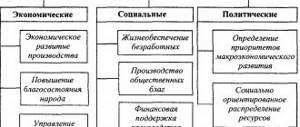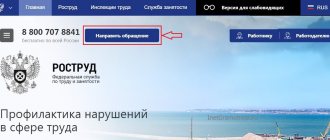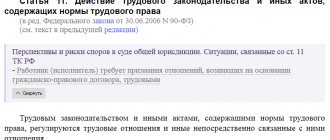Requirements for the profession
An occupational health and safety inspector must be responsible and diligent, including being prepared for various stressful situations (stress resistance is a mandatory inherent quality).
In addition, it is mandatory to have an appropriate specialized education. Having a higher legal education is considered a huge plus.
Labor safety inspector is a highly qualified specialist
The inspector must know:
- norms of the Labor Code of the Russian Federation;
- basics of document management;
- all basic legislative and legal norms without exception;
- labor protection instructions;
- a system of safety standards developed at the federal level;
- features of operation of this or that equipment;
- rules and methods of conducting briefings on the territory of enterprises.
Categories
Federal state supervision over compliance with labor legislation and other regulatory legal acts containing labor law norms implements the state’s obligation to respect and protect these rights and freedoms. The effectiveness of such protection directly depends on the conditions created in the state for the implementation of supervisory activities, in particular, on legal regulation. Read more about the powers of the federal labor inspectorate in the material presented. According to Part 1 of Art. 353 of the Labor Code of the Russian Federation, federal state supervision over compliance with labor legislation and other regulatory legal acts containing labor law norms is carried out by the federal labor inspectorate in the manner established by the Government of the Russian Federation.
STRUCTURE OF THE FEDERAL LABOR INSPECTION
The Federal Labor Inspectorate is a single centralized system consisting of a federal executive body authorized to conduct federal state supervision over compliance with labor legislation and other regulatory legal acts containing labor law norms, and its territorial bodies (state labor inspectorates).
In the structure of the federal executive authorities of the Russian Federation, the powers to exercise the functions of state supervision and control over compliance with labor legislation and other regulatory legal acts containing labor law norms are assigned to the Federal Service for Labor and Employment (Rostrud) [1].
Rostrud exercises the powers assigned to it directly and through its territorial bodies authorized to carry out state supervision and control over compliance with labor legislation and other regulatory legal acts containing labor law norms - state labor inspectorates in the constituent entities of the Russian Federation[2].
The activities of the federal labor inspection are managed by the head of Rostrud - the chief state labor inspector of the Russian Federation, appointed and dismissed by the Government of the Russian Federation.
Exercising federal supervision over compliance with labor legislation and other regulatory legal acts containing labor law norms is not the only area of activity of Rostrud.
In addition, Rostrud is entrusted with powers in the field of employment, alternative civil service, labor migration and the settlement of collective labor disputes.
A specialized structural unit of Rostrud, created to implement the functions of methodological support for state supervision and control over compliance with labor legislation and other regulatory legal acts containing labor law norms, as well as for organizing the activities of state labor inspectorates, is the Department of Supervision and Control over Compliance with Labor Legislation Federal Service for Labor and Employment , headed by the head of the Department, who is the deputy chief state labor inspector of the Russian Federation.
Reference. As of January 1, 2012, the Federal Service for Labor and Employment administered 82 state labor inspectorates.
BASICS OF THE FEDERAL LABOR INSPECTION
The Federal Labor Inspectorate is guided in its activities by the Constitution of the Russian Federation, federal constitutional laws, federal laws, acts of the President of the Russian Federation and the Government of the Russian Federation, international treaties of the Russian Federation, and regulatory legal acts of the Ministry of Labor of Russia.
In accordance with the provisions of Art. 355 of the Labor Code of the Russian Federation, the main tasks of the federal labor inspectorate are:
1) ensuring compliance and protection of labor rights and freedoms of citizens, including the right to safe working conditions;
2) ensuring compliance by employers with labor legislation and other regulatory legal acts containing labor law standards;
3) providing employers and employees with information on the most effective means and methods of compliance with the provisions of labor legislation and other regulatory legal acts containing labor law norms;
4) bringing to the attention of the relevant government authorities facts of violations, actions (inaction) or abuses that are not subject to labor legislation and other regulatory legal acts containing labor law norms.
Regulatory legal acts defining the legal status and powers of the federal labor inspectorate:
- Labor Code of the Russian Federation;
- Regulations on the Federal Service for Labor and Employment (approved by Decree of the Government of the Russian Federation of June 30, 2004 No. 324, as amended on June 19, 2012);
- Decree of the Government of the Russian Federation dated 04/06/2004 No. 156 “Issues of the Federal Service for Labor and Employment” (as amended on 01/28/2011);
- Model regulations on the territorial body of the Federal Service for Labor and Employment (approved by Order of the Ministry of Health and Social Development of Russia dated July 1, 2009 No. 378n, as amended on August 25, 2010);
- Regulations of the Federal Service for Labor and Employment (approved by Order of Rostrud dated September 11, 2007 No. 211, as amended on May 24, 2010).
Regulatory legal acts regulating the organization and powers of the federal labor inspectorate to exercise federal state supervision over compliance with labor legislation and other regulatory legal acts containing labor law norms:
- Labor Code of the Russian Federation;
- Code of the Russian Federation on Administrative Offences;
- Convention No. 81 of the International Labor Organization “On Labor Inspection in Industry and Commerce” (adopted in Geneva on July 11, 1947, ratified by Federal Law No. 58-FZ of April 11, 1998);
- Federal Law No. 294-FZ dated December 26, 2008 “On the protection of the rights of legal entities and individual entrepreneurs in the exercise of state control (supervision) and municipal control” (as amended on July 28, 2012);
- Federal Law No. 59-FZ dated May 2, 2006 “On the procedure for considering appeals from citizens of the Russian Federation” (as amended on July 27, 2010).
POWERS OF THE FEDERAL LABOR INSPECTION
Based on the assigned tasks, in accordance with the provisions of Art. 356 of the Labor Code of the Russian Federation, the federal labor inspectorate exercises the following main powers:
- carries out state supervision and control over employers' compliance with labor legislation and other regulatory legal acts containing labor law norms, through inspections, surveys, issuing binding orders to eliminate violations, drawing up protocols on administrative offenses within the scope of authority, and preparing other materials (documents) on bringing the perpetrators to justice in accordance with federal laws and other regulatory legal acts of the Russian Federation;
- analyzes the circumstances and causes of identified violations, takes measures to eliminate them and restore the violated labor rights of citizens;
- carries out, in accordance with the legislation of the Russian Federation, the consideration of cases of administrative offenses;
- sends, in the prescribed manner, relevant information to federal executive authorities, executive authorities of constituent entities of the Russian Federation, local government bodies, law enforcement agencies and courts;
- carries out supervision and control over compliance with the established procedure for investigating and recording industrial accidents;
- analyzes the state and causes of industrial injuries and develops proposals for their prevention, takes part in the investigation of industrial accidents or conducts it independently;
- exercises supervision and control over the implementation of workers' rights to receive benefits under compulsory social insurance against accidents at work and occupational diseases, as well as over the appointment, calculation and payment of temporary disability benefits at the expense of employers;
- takes the necessary measures to attract qualified experts in the prescribed manner in order to ensure the application of the provisions of labor legislation and other regulatory legal acts related to the protection of the health and safety of workers during their work, as well as obtain information on the impact of the methods used, materials and methods used on the condition worker health and safety;
- requests from federal executive authorities and their territorial bodies, executive authorities of constituent entities of the Russian Federation, local governments, prosecutors, judicial authorities and other organizations and receives from them free of charge the information necessary to perform the tasks assigned to it;
- provides information and consultation to employers and employees on issues of compliance with labor legislation and other regulatory legal acts containing labor law standards, etc.
According to Art. 216.1 of the Labor Code of the Russian Federation, the Federal Labor Inspectorate is authorized to carry out state examination of working conditions, monitor the results of workplace certification carried out by employers in accordance with the established procedure for working conditions in order to generate objective information about the state of working conditions of workers, including those employed in work with hazardous and ( or) hazardous working conditions[3].
The Federal Labor Inspectorate is given the right to apply restrictive, precautionary and prophylactic measures provided for by the legislation of the Russian Federation, aimed at preventing and (or) eliminating the consequences of violations by legal entities and citizens of mandatory requirements in the established field of activity[4].
The federal labor inspection bodies in the constituent entities of the Russian Federation carry out supervisory measures aimed at ensuring that business entities comply with the requirements of labor legislation in relation to the foreign workers they attract in the prescribed manner, as well as monitoring compliance with restrictions on the use of foreign labor annually established by the Government of the Russian Federation[5] .
[1] Subparagraph “a” of paragraph 4 of Decree of the President of the Russian Federation dated 03/09/2004 No. 314 “On the system and structure of federal executive bodies” (as amended on 06/22/2010).
[2] Regulations on the Federal Service for Labor and Employment (approved by Decree of the Government of the Russian Federation dated June 30, 2004 No. 324, as amended on June 19, 2012), Decree of the Government of the Russian Federation dated April 6, 2004 No. 156 “Issues of the Federal Service for Labor and Employment” (as amended on January 28, 2011).
[3] The procedure for certification of workplaces according to working conditions (approved by Order of the Ministry of Health and Social Development of Russia dated April 26, 2011 No. 342n), Order of the Ministry of Health and Social Development of Russia dated April 1, 2010 No. 205n “On approval of the list of services in the field of labor protection, the provision of which requires accreditation, and Rules for the accreditation of organizations providing services in the field of labor protection" (as amended on November 22, 2011).
[4] Clause 6.5 of the Regulations on the Federal Service for Labor and Employment.
[5] Article 32 of the Federal Law of July 25, 2002 No. 115-FZ “On the legal status of foreign citizens in the Russian Federation” (as amended on July 28, 2012), Decree of the Government of the Russian Federation of November 12, 2010 No. 895 “On determining the need to attract to the Russian Federation of foreign workers and approval of the corresponding quotas for 2011,” Orders of the Ministry of Health and Social Development of Russia dated December 8, 2010 No. 1081n (as amended on December 14, 2011), dated December 8, 2010 No. 1080n (as amended on December 14, 2011).
Rights of state labor inspectors
Health and Safety Engineer
The state labor inspector has the right, in accordance with his job description:
- carry out inspections of any enterprise;
- identify existing violations in the field of labor protection;
- draw up appropriate inspection reports;
- determine the extent of detected violations and the level of responsibility of officials: issue fines, bring to administrative responsibility.
Rights are secured by the norms of the Labor Code of the Russian Federation
In addition, the authorized labor protection inspector (according to the established professional standard):
- takes responsibility for investigating accidents that occur on the territory of the enterprise;
- suspend the operation of the enterprise if gross violations of the current norms of Russian legislation are detected, which entails a threat to the lives of hired personnel.
For your information! What rights state labor inspectors do not have are detailed in Part 2 of Art. 357 Labor Code of the Russian Federation.
Protection of workers' rights. Part 33
Image: rostrud.ru
State labor inspectors have rights and responsibilities, a procedure for conducting inspections has been established, as well as responsibility for illegal actions (inaction).
Continuation. Beginning in Nos. , , , , , , , , , , , , , , , , , 2018; No. , , , , , , , , , , , , , , , , , , 2019
BASIC WAYS TO PROTECT RIGHTS AND FREEDOMS IN THE FIELD OF LABOR (end)
Basic rights of state labor inspectors (Article 357 of the Labor Code of the Russian Federation)
When exercising state supervision over compliance with labor legislation and other regulatory legal acts (hereinafter - NLA) containing labor law norms, state labor inspectors have the right:
- in accordance with the established procedure, without hindrance, at any time, with the presence of established certificates, visit organizations of all organizational and legal forms and forms of ownership, individual employers to check;
— request from employers, executive authorities, local governments, and other organizations and receive from them free of charge documents, explanations, information necessary to perform supervisory and control functions;
- remove samples of used materials and substances for analysis in the prescribed manner, with notification to the employer, draw up a report;
— investigate industrial accidents;
— present employers with binding orders to eliminate violations of labor legislation and other regulations, to restore the violated rights of employees, to bring those responsible for the violation to disciplinary liability or removal from office;
— submit to the courts demands for the liquidation of organizations or termination of the activities of their structural divisions due to violation of labor protection requirements;
— issue orders to remove from work persons who have not completed: training in safe methods and techniques of work, instruction on labor protection, on-the-job training and testing of knowledge of labor protection requirements;
— prohibit the use of individual and collective protective equipment that does not comply with the requirements of the legislation of the Russian Federation on technical regulation and state regulatory requirements for labor protection;
— draw up protocols and, within the limits of authority, consider cases of administrative offenses, send other materials (documents) to law enforcement agencies and the court on bringing the perpetrators to justice;
— act as experts in court on claims for violation of labor laws and other regulations, for compensation for harm caused to the health of workers at work;
— present to the organization conducting the special assessment system mandatory instructions to eliminate violations of the requirements of the legislation on the special assessment system.
Trade union bodies, workers and other persons can apply to the State Labor Inspectorate. If we are talking about issues considered in an individual or collective labor dispute (except for those considered by the court or having its decision), the state inspector, having identified a violation, has the right to issue a mandatory order to the employer. Within 10 days, the order can be appealed in court.
Responsibilities of state labor inspectors (Article 358 of the Labor Code of the Russian Federation)
When carrying out state supervision, state labor inspectors are obliged to comply with the legislation of the Russian Federation, the rights and legitimate interests of employers - both individuals and legal entities. And they are obliged to keep secrets protected by law (state, official, commercial, etc.) that have become known to them. And after leaving the position, consider the source of any complaint about violations of labor laws and other regulations absolutely confidential, and do not provide the employer with information about the applicant.
State labor inspectors, when exercising their rights and performing their duties, are authorized representatives of the state and are under its protection (Article 359 of the Labor Code of the Russian Federation), independent of government agencies, officials and subject only to the law.
The procedure for checking employers (Article 360 of the Labor Code of the Russian Federation)
It is determined by ILO conventions on labor inspection issues ratified by the Russian Federation, the Labor Code of the Russian Federation, other federal laws, and decisions of the government of the Russian Federation. State labor inspectors conduct scheduled and unscheduled inspections throughout the Russian Federation of any employers in the manner established by the Federal Law, taking into account the features established by Art. 360 Labor Code of the Russian Federation.
Subject of inspection: compliance with labor laws and other regulations; implementation of orders to eliminate violations and to take measures to prevent violations of labor law and to protect the labor rights of citizens.
Grounds for an unscheduled inspection: expiration of the deadline for fulfilling the order to eliminate the violation or receipt by the Federal Labor Inspectorate (FIT):
a) appeals and statements from citizens, individual entrepreneurs, legal entities, information from authorities (FIT officials), state control (supervision) authorities, local governments, trade unions, the media about violations by employers of labor legislation and other regulations, labor safety requirements - about life-threatening conditions and employee health violations or violations that led to non-payment, incomplete payment or understatement of wages or other payments;
b) employee reports of violation of his labor rights;
c) an employee’s request to check the conditions and labor protection at his workplace in accordance with Art. 219 Labor Code of the Russian Federation;
d) an order from the head (his deputy) of the FIT on an unscheduled inspection, issued on behalf of the President or Government of the Russian Federation or at the request of the prosecutor (in the order of supervision).
An unscheduled on-site inspection of violations can be carried out immediately, with notification of the prosecutor's office, without coordination with it. Preliminary notification of the employer about an unscheduled inspection based on the specified facts or at the request of the employee is not allowed.
The specifics of inspections of compliance with labor legislation in organizations subordinate to the federal executive branch in the field of defense, security, internal affairs, the Federal Penitentiary Service and the authorized body for managing the use of atomic energy are established by the President or the Government of the Russian Federation.
Decisions of state labor inspectors can be appealed to the subordinate manager, the chief state labor inspector of the Russian Federation and (or) to court. Decisions of the chief state labor inspector of the Russian Federation can be appealed to the court (Article 361 of the Labor Code of the Russian Federation).
Responsibility
Managers and officials of organizations, individual employers are responsible for violation of the law in cases and in the manner established by the Labor Code of the Russian Federation and other Federal Laws. For violation of the labor rights of employees, liability arises on the basis of the Labor Code, Code of Administrative Offenses, and Criminal Code - disciplinary, material, administrative, criminal. The liability of those who interfere with state supervision of compliance with legislation, do not comply with orders, or threaten state labor inspectors, members of their families, and their property is established by the Federal Law (Article 363 of the Labor Code of the Russian Federation). For illegal actions (inaction), state labor inspectors bear responsibility established by the Federal Law (Article 364 of the Labor Code of the Russian Federation).
State labor inspectors are federal state civil servants (Article 6 of ILO Convention No. 81; Federal Law of July 27, 2004 No. 79 “On the State Civil Service of the Russian Federation”). For failure or improper performance by such an employee through his fault of his own duties, the employer's representative has the right to apply disciplinary sanctions: reprimand, reprimand, warning of incomplete official compliance, dismissal from the civil service (Article 57 of Federal Law No. 79).
For illegal actions (inaction), state labor inspectors (legal and labor protection) may be subject to: 1) disciplinary liability (Articles 192 - 194 of the Labor Code of the Russian Federation, Federal Law-79); 2) to administrative liability (Administrative Code - Article 19.6.1 “Failure of officials of state control (supervision) bodies to comply with the requirements of legislation on state control (supervision)”, Article 19.1 “Arbitrariness”); 3) to property liability (Civil Code of the Russian Federation - Article 15 “Compensation for losses”, Article 16 “Compensation for losses caused by state bodies and local government bodies”, Article 1069 “Liability for damage caused by state bodies, local government bodies, as well as their officials"); 4) to criminal liability (Criminal Code of the Russian Federation - Article 285 “Abuse of Official Powers”, Article 286 “Excess of Official Powers”, Article 293 “Negligence”).
Acts of an official when using official powers that entailed causing harm to interests protected by criminal law cannot be recognized as criminal if these acts were committed in pursuance of an order or instruction that is obligatory for him (Article 42 of the Criminal Code of the Russian Federation; clause 14 of the resolution of the plenum of the Armed Forces of the Russian Federation dated 16.10 .2009 No. 19 “On judicial practice in cases of abuse of power and abuse of power”).
Let us also note that Rostrud functions in cooperation with federal executive authorities that carry out state supervision in the established field, other executive authorities: federal, constituent entities of the Russian Federation, local government, prosecutor’s office, as well as trade unions (their associations), employers’ associations, etc. (Article 365 Labor Code of the Russian Federation). Rostrud and its territorial bodies enter into agreements on interaction with all-Russian and territorial associations of trade unions.
State labor inspectorates use various forms of interaction with citizens, public organizations and the media: international conferences, press conferences, round tables, lectures and seminars; dissemination of information in the media (interviews, comments, social advertising); official website of Rostrud and web-representation of state labor inspectorates; leaflets, brochures; information on billboards, on stickers in transport; “Online inspection.RF” operates. On the Rostrud website, anyone can report a violation of their labor rights and freedoms.
The author is Deputy Head of the Department of Social and Labor Relations of the Federation of Independent Trade Unions of Russia
To be continued
Responsibilities of state labor inspectors
Occupational Health and Safety Specialist
The actions of the chief inspector of the labor inspectorate are enshrined in labor legislation.
The legislation of the Russian Federation has established the following responsibilities for them:
- inspection of enterprises in accordance with the established procedure. Inspection is required according to the instructions with the drawing up of an appropriate conclusion;
- if violations are identified, remove the guilty officials from work until the investigation of the situation is completed;
- impose a fine if necessary;
- draw up a protocol;
- investigate injuries or fatalities at work.
The inspector's job description includes comprehensive information about the rights and responsibilities of the specialist.
Labor Code of the Russian Federation:
Article 357 of the Labor Code of the Russian Federation. Basic rights of state labor inspectors
State labor inspectors, when exercising federal state supervision over compliance with labor legislation and other regulatory legal acts containing labor law norms, have the right to:
in the manner established by federal laws and other regulatory legal acts of the Russian Federation, freely visit organizations of all organizational and legal forms and forms of ownership, employers - individuals, in order to conduct an inspection at any time of the day in the presence of standard identification documents;
request from employers and their representatives, executive authorities and local governments, other organizations and receive from them free of charge documents, explanations, information necessary to perform supervisory and control functions;
remove for analysis samples of used or processed materials and substances in the manner established by federal laws and other regulatory legal acts of the Russian Federation, notifying the employer or his representative about this and drawing up a corresponding act;
investigate industrial accidents in accordance with the established procedure;
present to employers and their representatives mandatory orders to eliminate violations of labor legislation and other regulatory legal acts containing labor law norms, to restore the violated rights of employees, to bring those responsible for these violations to disciplinary liability or to remove them from office in the prescribed manner;
the paragraph is no longer valid. — Federal Law of 05/09/2005 N 45-FZ;
submit to the courts demands for the liquidation of organizations or termination of the activities of their structural divisions due to violation of labor protection requirements;
issue orders to remove from work persons who have not undergone training in safe methods and techniques for performing work, instruction in labor safety, on-the-job training, and testing of knowledge of labor safety requirements;
prohibit the use of personal and collective protective equipment for workers if such means do not comply with the mandatory requirements established in accordance with the legislation of the Russian Federation on technical regulation and state regulatory requirements for labor protection;
paragraphs eleven through twelve are no longer valid. — Federal Law of June 30, 2006 N 90-FZ;
draw up protocols and consider cases of administrative offenses within the limits of authority, prepare and send to law enforcement agencies and the court other materials (documents) on bringing the perpetrators to justice in accordance with federal laws and other regulatory legal acts of the Russian Federation;
act as experts in court on claims for violation of labor legislation and other regulatory legal acts containing labor law norms, for compensation for harm caused to the health of workers at work;
present to the organization conducting a special assessment of working conditions mandatory instructions to eliminate violations of the requirements of the law on a special assessment of working conditions.
make a decision on the forced execution of the employer’s obligation to pay accrued but not paid wages to the employee on time and (or) other payments made within the framework of labor relations, in accordance with Article 360.1 of this Code.
If a trade union body, employee or other person applies to the state labor inspectorate on an issue being considered by the relevant body for consideration of an individual or collective labor dispute (except for claims accepted for consideration by the court, or issues on which there is a court decision), the state a labor inspector, upon identifying an obvious violation of labor legislation or other regulatory legal acts containing labor law norms, has the right to issue an order to the employer that is subject to mandatory execution. This order may be appealed by the employer to the court within ten days from the date of its receipt by the employer or his representative.
Return to the table of contents of the document: Labor Code of the Russian Federation in the current edition
Job description of a labor safety inspector
Bibliography on occupational health and safety
Appointed state inspectors in the field of labor protection, in accordance with the job description, must:
Each specialist must follow the instructions
- strictly comply with the norms of current federal legislation, including, if necessary, defending the rights and legitimate interests of employers and hired personnel in particular;
- keep a secret (it doesn’t matter which one: state, official, commercial, etc.) that became known during the performance of one’s official duties, including after dismissal from one’s position, since it is considered completely confidential. If the rules are ignored, there is a chance of incurring criminal liability with all the ensuing consequences.
Note! Additionally, it is required to refrain from notifying the direct employer about the applicant’s data if the verification was initiated based on a request or complaint from hired employees of the enterprise.
Occupational health and safety at school Instruction packages for schools and preschool educational institutions
Question: A state labor inspector should come to our institution for an inspection. What rights does GIT have? What inspections does the state labor inspector carry out?
What rights do state labor inspectors not have? What basic rights are given to state legal labor protection inspectors? Answer: According to Article 357 of the Labor Code of the Russian Federation, the state labor inspector, when exercising federal state supervision over compliance with labor legislation, has the right:
- in the manner established by federal laws and other regulatory legal acts of the Russian Federation, freely visit organizations of all organizational and legal forms and forms of ownership in order to conduct an inspection at any time of the day, in the presence of standard identification documents;
- request from employers and their representatives and receive from them free of charge documents, explanations, information necessary to perform supervisory and control functions;
- remove for analysis samples of used or processed materials and substances in the manner established by federal laws and other regulatory legal acts of the Russian Federation, notifying the employer or his representative about this and drawing up a corresponding act;
- investigate accidents at work in accordance with the established procedure;
- present to employers and their representatives mandatory orders to eliminate violations of labor legislation and other regulatory legal acts containing labor law norms, to restore the violated rights of employees, to bring those responsible for these violations to disciplinary liability or to remove them from office in the prescribed manner;
- submit to the courts demands for the liquidation of organizations or termination of the activities of their structural divisions due to violation of labor protection requirements;
- issue orders to remove from work persons who have not undergone training in safe methods and techniques for performing work, instruction in labor safety, on-the-job training, and testing of knowledge of labor safety requirements;
- prohibit the use of personal and collective protective equipment for workers if such means do not meet mandatory requirements;
- draw up protocols and consider cases of administrative offenses within the limits of authority, prepare and send to law enforcement agencies and the court other materials (documents) on bringing the perpetrators to justice;
- act as experts in court on claims for violation of labor legislation and other regulatory legal acts containing labor law norms, for compensation for harm caused to the health of workers at work;
- present to the organization conducting a special assessment of working conditions mandatory instructions to eliminate violations of the requirements of the law on a special assessment of working conditions.
In accordance with rights, the subject of inspection by a state labor inspector in an organization, institution (school, preschool educational institution) or enterprise is compliance with the requirements of labor legislation and other regulatory legal acts containing labor law norms, compliance with orders to eliminate violations identified during inspections and to carry out measures to prevent violations of labor law and to protect the labor rights of citizens (Article 360 of the Labor Code of the Russian Federation).
We recommend visiting the section: Labor protection documents for cafes
If you liked the page, share it on social networks:
Conducting an inspection by a state labor protection inspector
In order to organize and implement appropriate supervision at the state level, qualified specialists carry out the following types of inspections:
- unscheduled;
- planned.
The main task of conducting inspections is to identify facts of full compliance with the stated requirements of Russian legislation, fulfill all existing requirements, as well as eliminate violators with further prosecution.
An unscheduled inspection can be initiated on the basis of:
- expiration of the validity period of a previously issued order by specialists of the regional representative office of the labor inspectorate on the need to eliminate identified violations to ensure maximum safety on the territory of the enterprise;
- receiving complaints or other messages about existing violations at a particular employer.
Important! Inspections of this kind can be officially and legally carried out in the shortest possible time, and with notification of other authorized government bodies (for example, the prosecutor's office) in a clearly defined manner, without prior agreement with the direct employer.
Violations will result in fines
The norms of federal legislation categorically prohibit informing the employer about an unscheduled on-site inspection in order to confirm violations of the stated requirements for ensuring labor safety, including ignoring the rights of hired personnel to wages, work and rest hours, etc.
Can a state labor inspector suspend the work of an organization?
In accordance with his job description, each labor inspectorate employee has the right to make an appropriate decision.
Note! As a rule, this becomes a consequence of a gross violation identified, which carries high risks to the health and life of the hired staff in particular.
BASIC RIGHTS OF LABOR INSPECTORS
The basic rights of labor inspectors are set out in Article 357 of the Labor Code of the Russian Federation.
State labor inspectors have the right:
1) freely, at any time of the day, in the presence of standard identification documents, visit organizations of all organizational and legal forms and forms of ownership, as well as employers-individual entrepreneurs, for the purpose of conducting an inspection.
This right of labor inspectors is also enshrined in subsection. “a” paragraph 1 of article 12 of ILO Convention No. 81 (1947).
In this case, checks must be carried out in the manner established by federal laws and other regulations of the Russian Federation. Currently, such a law is Law No. 294-FZ
If the visit of a labor inspector is related to the investigation of an industrial accident, one should also be guided by the Regulations on the peculiarities of the investigation of industrial accidents in certain industries and organizations, approved by Resolution of the Ministry of Health and Social Development of Russia dated October 24, 2002 No. 73;
2) request from employers and their representatives and receive from them free of charge documents, explanations, information necessary to perform supervisory and control functions;
3) remove for analysis samples of used or processed materials and substances in the manner established by federal laws and other regulatory legal acts of the Russian Federation, with notification of this to the employer or his representative and draw up a corresponding act;
4) investigate industrial accidents in accordance with the established procedure.
The procedure for conducting investigations of industrial accidents is established by Article 229.2 of the Labor Code of the Russian Federation;
5) present mandatory instructions to employers and their representatives:
- on eliminating violations of labor legislation and other regulatory legal acts containing labor law norms,
- on restoring the violated rights of employees, bringing those responsible for these violations to disciplinary liability or removing them from office in the prescribed manner;
6) send to the courts demands for the liquidation of organizations or termination of the activities of their structural divisions due to violation of labor protection requirements;
7) issue orders to remove from work persons who have not undergone training in safe methods and techniques for performing work, instruction on labor protection, on-the-job training and testing of knowledge of labor protection requirements in accordance with the established procedure.
The procedure for training in labor protection and testing knowledge of labor protection requirements for employees of organizations is approved by Resolution of the Ministry of Labor of the Russian Federation and the Ministry of Education of the Russian Federation dated January 13, 2003 No. 1/29.
 prohibit the use of personal and collective protective equipment for workers if such means do not comply with the mandatory requirements established in accordance with the legislation of the Russian Federation on technical regulation and state regulatory requirements for labor protection;
prohibit the use of personal and collective protective equipment for workers if such means do not comply with the mandatory requirements established in accordance with the legislation of the Russian Federation on technical regulation and state regulatory requirements for labor protection;
9) draw up protocols and consider cases of administrative offenses within the limits of authority, prepare and send to law enforcement agencies and the court other materials (documents) on bringing the perpetrators to justice in accordance with federal laws and other regulatory legal acts of the Russian Federation.
Note!
Labor inspectors have the right to independently hold employers accountable in the form of an administrative fine. Going to court to hold an employer liable is required only in certain cases established by law;
10) act as experts in court on claims for violation of labor legislation and other regulatory legal acts containing labor law norms, for compensation for harm caused to the health of workers at work;
11) present to the organization conducting the special assessment of working conditions mandatory instructions to eliminate violations of the requirements of the legislation on the special assessment of working conditions;
12) if the labor inspector identifies an obvious violation of labor legislation or other regulatory legal norms containing labor law norms, and this issue has already been submitted for consideration to the relevant body (for example, to the commission for the consideration of labor disputes), he issues an order to the employer that is subject to mandatory execution .
This order can be appealed by the employer in court within 10 days from the date of its receipt.
We draw the attention of employers to a special 10-day period for appealing such an order.
This period is calculated from the day the employer (employer's representative) receives the order (copy of the order).
The order (or a copy thereof) is handed over by the labor inspector to the employer's representative against signature. As a rule, the receipt of the document is signed on the order itself, and a copy of the order is given to the employer.
In addition to the signature, the employer’s representative puts down the date of receipt of the order.
How to calculate the period if this date is not indicated?
In this case, the employer must register the received order in the incoming correspondence book and indicate the date of receipt of the document.
It is this date that will be the beginning of the calculation of the procedural 10-day period (Determination of the St. Petersburg City Court dated February 15, 2010 No. 1805).
The same should be done if the order is sent by the labor inspector to the employer by mail.
The First Consulting Center provides a full range of HR audit services ( more details… )
Note!
The labor inspector does not have the right to issue an order if the issue has been accepted for consideration by the court or there is already a court decision on this issue (Part 2 of Article 357 of the Labor Code of the Russian Federation).
Now let’s look at what actions labor inspectors are not entitled to carry out.
So, labor inspectors do not have the right (Article 15 of Law No. 294-FZ):
1) carry out a scheduled or unscheduled on-site inspection in the absence of a manager, other official or authorized representative of a legal entity, individual entrepreneur, or his authorized representative during the inspection.
An exception to this rule is causing harm to the life and health of citizens.
Here you need to keep the following in mind.
This provision is aimed at ensuring the participation of the head of the organization (individual entrepreneur) in the inspection, and it cannot be a formal reason for refusing to carry out the inspection.
For example, a labor inspector may come with an unscheduled inspection, and the head of the organization (entrepreneur), in order to impede the inspection, decides to leave the organization’s territory.
Formally, the labor inspector does not have the right to carry out an inspection in the absence of the head of the organization (individual entrepreneur).
However, in fact, such a situation will not be an obstacle to the inspection, since:
- firstly, the right to participation of the head of the organization (entrepreneur) was ensured;
- secondly, the presence of the manager at the beginning of the inspection must be recorded in the inspection report.
And the further absence of the manager during the inspection process is explained by his personal expression of will, and not by the actions of the labor inspector. Such conclusions are contained in the Resolution of the Federal Antimonopoly Service of the North-Western District dated March 16, 2010 No. A13-8136/2009 (Decision of the Supreme Arbitration Court of the Russian Federation dated July 20, 2010 No. VAS-9259/10 denied the transfer of the case to the Presidium of the Supreme Arbitration Court of the Russian Federation).
The courts also believe that by notifying the organization about the upcoming inspection, the labor inspector gives it the opportunity to ensure the participation of the manager (representative) in this inspection (Resolution of the Federal Antimonopoly Service of the North Caucasus District dated December 14, 2010 No. A15-303/2010).
It is also interesting to pay attention to the following point.
Clause 2 of Art. 15 of Law No. 294-FZ establishes a ban on conducting inspections in the absence of the head of the organization (entrepreneur).
Meanwhile, a violation of this rule is not classified by Article 20 of Law No. 294-FZ as a gross violation, in the presence of which the inspection report is subject to cancellation at the request of the person being inspected.
That is, even if the inspection was carried out in the absence of the head of the organization (entrepreneur) or his representative, this fact in itself is not a basis for canceling the inspection report (Resolution of the Federal Antimonopoly Service of the North Caucasus District dated December 16, 2010 No. A15-349/2010 ).
Moreover, by virtue of Article 25 of Law No. 294-FZ, when conducting inspections, legal entities are required to ensure the presence of managers (other officials or authorized representatives); individual entrepreneurs are required to be present themselves or ensure the presence of authorized representatives.
On August 1, 2011, special administrative liability was introduced for violation of this obligation (Article 19.4.1 of the Code of Administrative Offenses of the Russian Federation).
Thus, for evading inspection there is a fine in the amount of:
- from 2000 to 4000 rubles – for officials;
- from 5,000 to 10,000 rubles – for organizations.
The amount of the fine increases if the actions (or inaction) of the organization or its leader made it impossible to conduct an inspection.
In this case, the amount of the fine will be:
- from 5,000 to 10,000 rubles – for officials;
- from 20,000 to 50,000 rubles – for organizations (Part 2 of Article 19.4.1 of the Code of Administrative Offenses of the Russian Federation);
2) demand the submission of documents not related to the subject of the inspection.
For this violation, the inspection report is already subject to cancellation at the request of the person being inspected (subparagraph 5, paragraph 2, article 20 of Law No. 294-FZ);
3) disseminate information obtained as a result of the inspection and constituting a state, commercial, official, or other secret protected by law, except for cases provided for by the legislation of the Russian Federation.
Please keep in mind that a trade secret regime cannot be established by persons engaged in business activities in relation to the following information (Article 5 of the Federal Law of July 29, 2004 No. 98-FZ “On Trade Secrets”):
- contained in the constituent documents of a legal entity, documents confirming the fact of making entries about legal entities and individual entrepreneurs in the relevant state registers;
- contained in documents giving the right to carry out entrepreneurial activities;
- on the composition of the property of a state or municipal unitary enterprise, state institution and on their use of funds from the corresponding budgets;
- about environmental pollution, the state of fire safety, the sanitary-epidemiological and radiation situation, food safety and other factors that have a negative impact on ensuring the safe operation of production facilities, the safety of each citizen and the safety of the population as a whole;
- on the number and composition of employees, the remuneration system, working conditions, including labor protection, indicators of industrial injuries and occupational morbidity, and the availability of available jobs;
- about the debt of employers in payment of wages and other social benefits;
- about violations of the legislation of the Russian Federation and facts of prosecution for committing these violations;
- on the conditions of competitions or auctions for the privatization of state or municipal property;
- on the size and structure of income of non-profit organizations, the size and composition of their property, their expenses, the number and remuneration of their employees, the use of gratuitous labor of citizens in the activities of a non-profit organization;
- on the list of persons who have the right to act without a power of attorney on behalf of a legal entity;
- the mandatory disclosure of which or the inadmissibility of restricting access to which is established by other federal laws;
4) exceed the established deadlines for conducting the inspection.
This is recognized as a gross violation of the rules for conducting an inspection, therefore, in such a situation, the inspection act can be canceled at the request of the person being inspected (subparagraph 3, paragraph 2, article 20 of Law No. 294-FZ);
5) issue instructions or proposals to legal entities and individual entrepreneurs to carry out control measures at their expense;
6) in the event that a labor dispute has already been accepted for consideration by the court or there is already a court decision on this issue, the labor inspector does not have the right to issue instructions to the employer on the same issue that are subject to mandatory execution.
If, nevertheless, such an order was issued, the employer has the right to appeal it within 10 days from the date of receipt (Part 2 of Article 357 of the Labor Code of the Russian Federation).
From July 1, 2015, controllers also do not have the right to:
- check compliance with the requirements established by the regulatory legal acts of the executive authorities of the USSR and the RSFSR and that do not comply with the legislation of the Russian Federation;
- verify compliance with mandatory requirements and requirements established by municipal legal acts not published in the manner established by the legislation of the Russian Federation
This also applies to gross violations of inspection rules.
Many employers mistakenly believe that only a representative of the Federal Social Insurance Fund of the Russian Federation or the tax authorities has the right to check the procedure for paying temporary disability benefits, as well as the amount of benefits paid.
This is wrong.
Employers need to know that labor inspectors have the right to supervise and control the implementation of workers’ rights to receive compulsory social insurance against accidents at work and occupational diseases, as well as the appointment, calculation and payment of temporary disability benefits at the expense of employers (Article .356 Labor Code of the Russian Federation).
For these purposes, the employer must provide the inspectors with sick leave certificates, as well as documents confirming the amount of benefits paid at the expense of the employer.
The State Labor Inspectorate inspector, in turn, has the right to demand the provision of documents confirming that the employer in the current and previous year, in accordance with the established procedure, timely and in full paid temporary disability benefits to employees (clause 41 of the Administrative Regulations).
Other
Appealing decisions of state labor inspectors
If an authorized specialist has drawn up an incorrect protocol on violations, each employer reserves the full legal right to appeal the decision in strict accordance with the norms of labor legislation. To do this you can contact:
- to the chief inspector;
- to the court with a corresponding statement of claim.
Note! Everyone has the right to choose the most optimal option for themselves. But the first appeal method is not relevant if the primary decision was made immediately by the chief specialist. In this case, all that remains is to file a corresponding claim with the court at the place of registration of the enterprise.
A labor safety inspector is a specialist who, first of all, must protect the interests of employed citizens. Anyone who meets the stated requirements has the right to occupy a position. A higher education is required.
Commentary on Article 357 of the Labor Code of the Russian Federation
1. To ensure that labor inspectors perform their functions, ILO Convention No. 81 “On Labor Inspection in Industry and Commerce” (adopted in Geneva on July 14, 1947) provides for their rights: to pass freely without prior notice and at any time of the day for any enterprise covered by inspection control; enter during the daytime all buildings which they have reasonable grounds to believe are subject to inspection control; carry out any checks, controls and investigations that they may consider necessary to ensure that the legislation is being effectively complied with, in particular in private or in the presence of witnesses, question the employer or company personnel in all areas relevant to the application of the legal provisions, require familiarization with any books, registers or documents the maintenance of which is required by law relating to working conditions, in order to verify their compliance with legal provisions and to make copies or extracts of certain places from them.
2. The commented article establishes a general set of rights of state labor inspectors, regardless of the specifics of the supervisory activities they carry out. At the same time, it should be borne in mind that in the federal labor inspection system, the activities of supervising and monitoring compliance with labor legislation are carried out by state legal labor inspectors and state labor protection inspectors. State legal labor inspectors supervise the observance of labor rights and freedoms of citizens, the application of labor legislation and are specialists in the field of law. State labor safety inspectors supervise the observance of the rights and freedoms of citizens, the application of labor legislation in terms of ensuring the right to safe working conditions and have the necessary knowledge in technical matters.
3. Orders submitted by the state labor inspector to the employer or his representative to eliminate violations of labor legislation and other regulatory legal acts, including those not related to the violation of the rights of a specific employee, to restore the violated rights of workers, to bring in persons guilty of the identified violations, disciplinary action or removal from office are mandatory. On appealing orders of state labor inspectors, see Art. 361 TC and commentary thereto.
Responsibility for failure to comply within the prescribed period with the order of the state labor inspector to eliminate violations of the law is provided for in Art. 19.5 Code of Administrative Offences. Relevant cases of administrative offenses are considered by the courts.
4. On the investigation and recording of industrial accidents, see Art. Art. 227 - 231 TC and commentary thereto.
5. The officials named in Art. 23.12 Code of Administrative Offences.
These persons have the right to draw up protocols on administrative offenses in cases of administrative offenses considered by them. In addition, officials of the Federal Service for Labor and Employment have the right to draw up protocols on administrative offenses provided for in Part 2 of Art. 5.27, part 1 art. 19.4, part 1 art. 19.5, Art. Art. 19.6, 19.7 Code of Administrative Offenses (Article 28.3 of the Code of Administrative Offenses). The list of persons authorized to draw up protocols on administrative offenses was approved by Order of the Federal Service for Labor and Employment of April 10, 2006 No. 60.
6. The Federal Labor Inspectorate does not carry out supervisory activities on issues that have been accepted for consideration by the court or on which there is already a court decision, regardless of whether it has entered into legal force. At the same time, accepting an issue for consideration by the CCC or initiating a collective labor dispute on it does not prevent the verification of compliance with labor legislation, labor rights and freedoms of citizens. However, in this case, the order is issued if there is an obvious (i.e. beyond doubt) violation. The order issued in this case to eliminate violations of labor legislation or other normative legal acts containing labor law norms is also subject to mandatory execution and can be appealed by the employer or his representative in a special manner: exclusively in court within 10 days from the date of receipt of the order. An appeal against this order in the order of subordination is not allowed.








